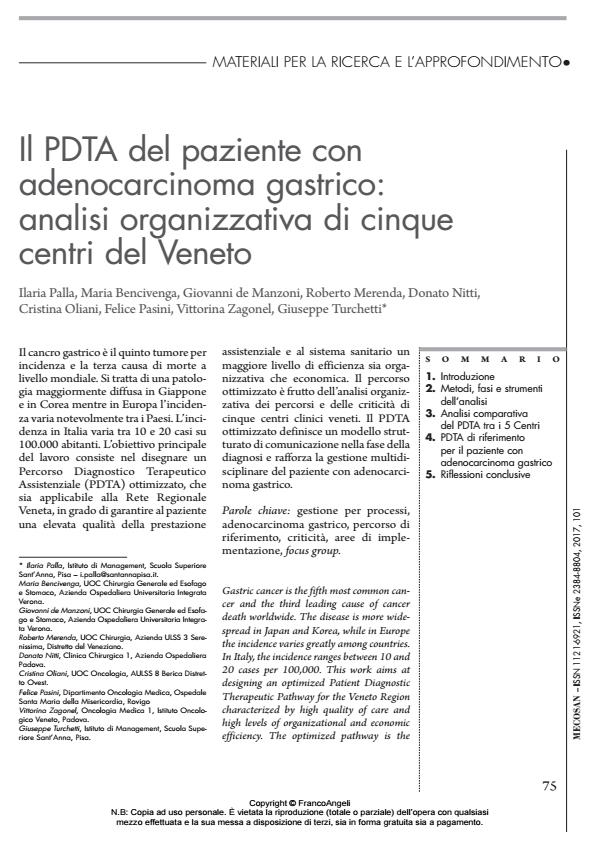Il PDTA del paziente con adenocarcinoma gastrico: analisi organizzativa di cinque centri del Veneto
Journal title MECOSAN
Author/s Ilaria Palla, Maria Bencivenga, Giovanni de Manzoni, Roberto Merenda, Donato Nitti, Cristina Oliani, Felice Pasini, Vittorina Zagonel, Giuseppe Turchetti
Publishing Year 2017 Issue 2017/101
Language Italian Pages 22 P. 75-96 File size 24148 KB
DOI 10.3280/MESA2017-101005
DOI is like a bar code for intellectual property: to have more infomation
click here
Below, you can see the article first page
If you want to buy this article in PDF format, you can do it, following the instructions to buy download credits

FrancoAngeli is member of Publishers International Linking Association, Inc (PILA), a not-for-profit association which run the CrossRef service enabling links to and from online scholarly content.
Gastric cancer is the fifth most common cancer and the third leading cause of cancer death worldwide. The disease is more widespread in Japan and Korea, while in Europe the incidence varies greatly among countries. In Italy, the incidence ranges between 10 and 20 cases per 100,000. This work aims at designing an optimized Patient Diagnostic Therapeutic Pathway for the Veneto Region characterized by high quality of care and high levels of organizational and economic efficiency. The optimized pathway is the result of the organizational analysis of five centers in terms of healthcare process and critical issues. The optimized Patient Diagnostic Therapeutic Pathway defines a planned communication model during the diagnosis phase and strengthens the multidisciplinary management of the patient with gastric cancer.
Keywords: Process management, gastric cancer, reference pathway, critical issues, implementation areas, focus group.
- Clinical pathways in gastric cancer care Maria Bencivenga, Ilaria Palla, Lorenzo Scorsone, Alberto Bortolami, Valentina Mengardo, Michele Pavarana, Giuseppe Turchetti, Giovanni de Manzoni, in Updates in Surgery /2018 pp.279
DOI: 10.1007/s13304-018-0544-2
Ilaria Palla, Maria Bencivenga, Giovanni de Manzoni, Roberto Merenda, Donato Nitti, Cristina Oliani, Felice Pasini, Vittorina Zagonel, Giuseppe Turchetti, Il PDTA del paziente con adenocarcinoma gastrico: analisi organizzativa di cinque centri del Veneto in "MECOSAN" 101/2017, pp 75-96, DOI: 10.3280/MESA2017-101005